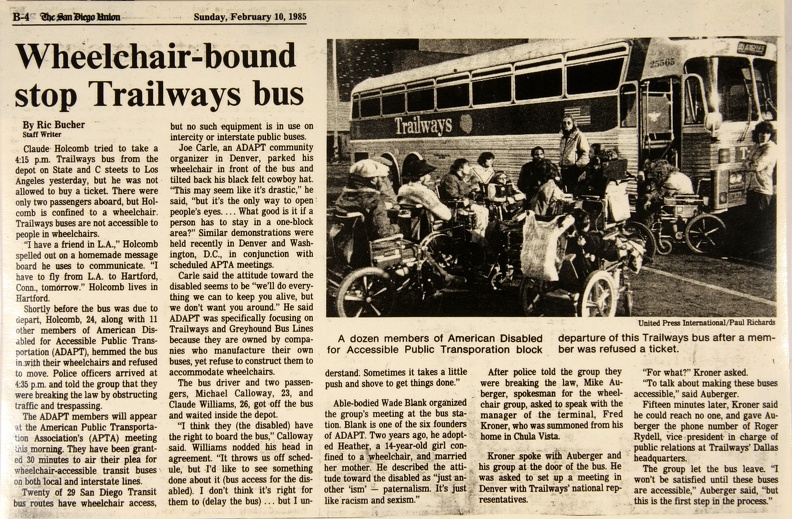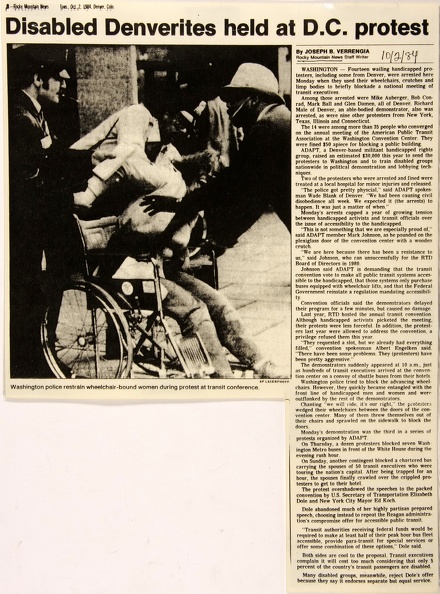- اللغةAfrikaans Argentina AzÉrbaycanca
á¥áá áá£áá Äesky Ãslenska
áá¶áá¶ááááá à¤à¥à¤à¤à¤£à¥ বাà¦à¦²à¦¾
தமிழ௠à²à²¨à³à²¨à²¡ ภาษาà¹à¸à¸¢
ä¸æ (ç¹é«) ä¸æ (é¦æ¸¯) Bahasa Indonesia
Brasil Brezhoneg CatalÃ
ç®ä½ä¸æ Dansk Deutsch
Dhivehi English English
English Español Esperanto
Estonian Finnish Français
Français Gaeilge Galego
Hrvatski Italiano Îλληνικά
íêµì´ LatvieÅ¡u Lëtzebuergesch
Lietuviu Magyar Malay
Nederlands Norwegian nynorsk Norwegian
Polski Português RomânÄ
Slovenšcina Slovensky Srpski
Svenska Türkçe Tiếng Viá»t
Ù¾Ø§Ø±Ø³Û æ¥æ¬èª ÐÑлгаÑÑки
ÐакедонÑки Ðонгол Ð ÑÑÑкий
СÑпÑки УкÑаÑнÑÑка ×¢×ר×ת
اÙعربÙØ© اÙعربÙØ©
الرئيسية / الألبومات / الكلمات الدلائلية Denver + blocking a bus
+ blocking a bus + Connecticut
+ Connecticut 2
2

 ADAPT (193)
ADAPT (193)
The San Diego Union, Sunday, February 10, 1985, B-4 PHOTO by United Press International/Paul Richards: 11 people in wheelchairs sit facing away from the camera, beside a Trailways bus. The group includes Bob Conrad who is closest the bus door, and Beverly Furnice who is closest to the camera. They are looking at Wade Blank, who stands beside the bus and it looks like Mike Auberger is addressing the group. Caption reads: A dozen members of American Disabled for Accessible Public Transportation block departure of this Trailways bus after a member was refused a ticket. [Headline] Wheelchair-bound stop Trailways bus By Ric Bucher, Staff Writer Claude Holcomb tried to take a 4:15 pm. Trailways bus from the depot on State and C streets to Los Angeles yesterday, but he was not allowed to buy a ticket. There were only two passengers aboard, but Holcomb is confined to a wheelchair. Trailways buses are not accessible to people in wheelchairs. “I have a friend in L.A.,” Holcomb spelled out on a homemade message board he uses to communicate. “I have to fly from L.A. to Hartford, Conn., tomorrow.” Holcomb lives in Hartford. Shortly before the bus was due to depart, Holcomb, 24, along with 11 other members of American Disabled for Accessible Public Transportation (ADAPT), hemmed the bus in with their wheelchairs and refused to move. Police officers arrived at 4:35 p.m. and told the group that they were breaking the law by obstructing traffic and trespassing. The ADAPT members will appear at the American Public Transportation Association's (APTA) meeting this morning. They have been granted 30 minutes to air their plea for both wheelchair-accessible transit buses on both local and interstate lines. Twenty of 29 San Diego Transit bus routes have wheelchair access, but no such equipment is in use on intercity or interstate public buses. Joe Carle, an ADAPT community organizer in Denver, parked his wheelchair in front of the bus and tilted back his black felt cowboy hat. “This may seem like it’s drastic,” he said, “but it’s the only way to open people’s eyes. ... What good is it if a person has to stay in a one-block area?” Similar demonstrations were held recently in Denver and Washington, D.C., in conjunction with scheduled APTA meetings. Carle said the attitude toward the disabled seems to be “we'll do everything we can to keep you alive, but we don’t want you around.” He said ADAPT was specifically focusing on Trailways and Greyhound Bus Lines because they are owned by companies who manufacture their own buses, yet refuse to construct them to accommodate wheelchairs. The bus driver and two passengers, Michael Calloway, 23, and Claude Williams, 26, got off the bus and waited inside the depot. “I think they (the disabled) have the right to board the bus,” Calloway said. Williams nodded his head in agreement. “It throws us off schedule, but I’d like to see something done about it (bus access for the disabled). I don’t think it’s right for them to (delay the bus) but I understand. Sometimes it takes a little push and shove to get things done." Able-bodied Wade Blank organized the group's meeting at the bus station. Blank is one of the six founders of ADAPT. Two years ago, he adopted Heather, a 14-year-old girl confined to a wheelchair, and married her mother. He described the attitude toward the disabled as “just another ‘ism’ — paternalism. It's just like racism and sexism.” After police told the group they were breaking the law, Mike Auberger, spokesman for the wheelchair group, asked to speak with the manager of the terminal, Fred Kroner, who was summoned from his home in Chula Vista. Kroner spoke with Auberger and his group at the door of the bus. He was asked to set up a meeting in Denver with Trailways’ national representatives. “For what?” Kroner asked “To talk about making these buses accessible," said Auberger. Fifteen minutes later, Kroner said he could reach no one, and gave Auberger the phone number of Roger Rydell, vice president in charge of public relations at Trailways’ Dallas headquarters. The group let the bus leave. “I won't be satisfied until these buses are accessible,” Auberger said, “but this is the first step in the process.” ADAPT (156)
ADAPT (156)
Rocky Mountain News Tues. Oct. 2, 1984 Denver, Colo. PHOTO (AP LASER PHOTO): A protester in a manual wheelchair and a puffy coat (Renata Conrad), screams as police force her arms behind her back. One uniformed officer stands behind her forcing her forward. One stands in front, his arms stretched in front. The third stands watching with his notebook in his hand and his pen or maybe a cigarette in his mouth. Caption reads: Washington police restrain wheelchair-bound women during protest at transit conference. [Headline] Disabled Denverites held at D.C. protest By JOSEPH B. VERRENGIA Rocky Mountain News Staff Writer WASHINGTON — Fourteen wailing handicapped protesters, including some from Denver, were arrested here Monday when they used their wheelchairs, crutches and limp bodies to briefly blockade a national meeting of transit executives. Among those arrested were Mike Auberger, Bob Conrad, Mark Ball and Glen Damen, all of Denver. Richard Male of Denver, an able-bodied demonstrator, also was arrested, as were nine other protesters from New York, Texas, Illinois and Connecticut. The 14 were among more than 35 people who converged on the annual meeting of the American Public Transit Association at the Washington Convention Center. They were fined $50 apiece for blocking a public building. ADAPT, a Denver-based militant handicapped rights group, raised an estimated $30,000 this year to send the protesters to Washington and to train disabled groups nationwide in political demonstration and lobbying techniques. Two of the protesters who were arrested and fined were treated at a local hospital for minor injuries and released. "The police got pretty physical,“ said ADAPT spokesman Wade Blank of Denver. "We had been causing civil disobedience all week. We expected it (the arrests) to happen. It was just a matter of when." Monday's arrests capped a year of growing tension between handicapped activists and transit officials over the issue of accessibility to the handicapped. “This is not something that we are especially proud of,"said ADAPT member Mark Johnson, as he pounded on the plexiglass door of the convention center with a wooden crutch. "We are here because there has been a resistance to us," said Johnson, who ran unsuccessfully for the RTD Board of Directors in 1980. Johnson said ADAPT is demanding that the transit convention vote to make all public transit systems accessible to the handicapped, that those systems only purchase buses equipped with wheelchair lifts, and that the Federal Government reinstate a regulation mandating accessibility. Convention officials said the demonstrators delayed their program for a few minutes, but caused no damage. Last year, RTD hosted the annual transit convention. Although handicapped activists picketed the meeting, their protests were less forceful. In addition, the protesters last year were allowed to address the convention, a privilege refused them this year. "They requested a slot, but we already had everything filled," convention spokesman Albert Engelken said. "There have been some problems. They (protesters) have been pretty aggressive." The demonstrators suddenly appeared at 10 a.m, just as hundreds of transit executives arrived at the convention center on a convoy of shuttle buses from their hotels. Washington police tried to block the advancing wheelchairs. However, they quickly became entangled with the front line of handicapped men and women and were outflanked by the rest of the demonstrators. Chanting "we will ride. it's our right," the protesters wedged their wheelchairs between the doors of the convention center. Many of them threw themselves out of their chairs and sprawled on the sidewalk to block the doors. Monday's demonstration was the third in a series of protests organized by ADAPT. On Thursday, a dozen protesters blocked seven Washington Metro buses in front of the White House during the evening rush hour. On Sunday, another contingent blocked a chartered bus carrying the spouses of 50 transit executives who were touring the nation's capital. After being trapped for an hour, the spouses finally crawled over the crippled protesters to get to their hotel. The protest overshadowed the speeches to the packed convention by U.S. Secretary of Transportation Elizabeth Dole and New York City Mayor Ed Koch. Dole abandoned much of her highly partisan prepared speech, choosing instead to repeat the Reagan administration's compromise offer for accessible public transit. "Transit authorities receiving federal funds would be required to make at least half of their peak hour bus fleet accessible, provide para-transit for special services or offer some combination of these options," Dole said. Both sides are cool to the proposal. Transit executives complain it will cost too much considering that only 5 percent of the country's transit passengers are disabled. Many disabled groups, meanwhile, reject Dole's offer because they say it endorses separate but equal service.